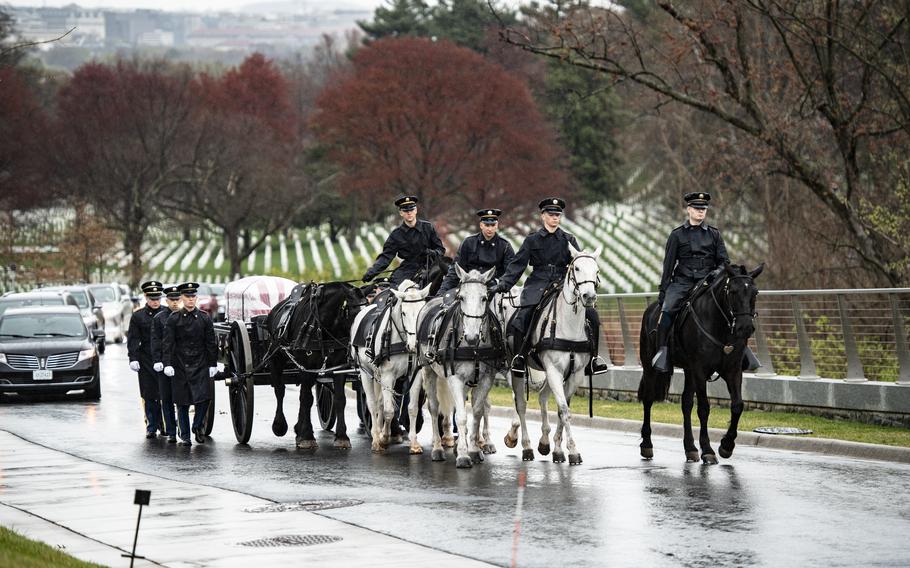
Soldiers from the 3rd U.S. Infantry Regiment, Caisson Platoon, and the U.S. Army Band conduct military funeral honors with a funeral escort at Arlington National Cemetery, Va., on March 24, 2023. (Elizabeth Fraser/Arlington National Cemetery)
WASHINGTON — Arlington National Cemetery will extend its suspension of horse-drawn funerals until June 2024 while the Army rehabilitates its troubled working horses program.
The 3rd Infantry Regiment's Caisson Platoon was initially pulled from escorting caskets of fallen service members to gravesites for 45 days, but Army officials said this week that the suspension will continue for a year to ensure the health of the platoon’s herd.
Veterinarians and equine experts recommended the extension to give the platoon’s 27 horses more time to rest and recover and allow the Army to make changes to stabilize the program, according to the service.
The working horses are at rehabilitation facilities for treatment of hoof, joint and muscle injuries related to their ceremonial work carrying a caisson, a chest formerly used for ammunition that has been used to bring dead soldiers off the battlefield since the 1800s.
An Army report last year showed its military working horses were suffering from poor and potentially life-threatening living conditions. Four of the Caisson Platoon’s horses died in the past two years, including two that had gravel and sand in their digestive systems.
The platoon typically takes part in up to eight military funerals per day at Arlington National Cemetery, a hallowed final resting place for more than 400,000 veterans and family members. The cemetery conducts up to 30 funeral services every workday.
The Army said it has already implemented several changes since removing the platoon’s horses from duty May 1, including initiating the development of a lighter-weight caisson and experimenting with caisson design to lessen the burden on horses. The caisson weighs about 2,800 pounds without the casket.
During the next year, the service plans to acquire new horses, purchase better-fitting saddles and tack, hire new trainers and support staff, and increase access to pastureland and improved facilities, according to the Army.
The suspension of the horses will not affect other elements of funeral honors at Arlington, such as a service band, escort platoon, firing party, body bearers and bugler, the Army said.
The remains of the fallen will now be carried in a hearse or a cemetery vehicle, depending on whether the remains are cremated or in a casket, according to the service.
The Army plans to gradually introduce horses back into memorial services, starting with a riderless horse that will trail the hearse for a small number of eligible funerals in late June. By fall, the Army expects to have a horse with a rider leading the hearse at all ceremonies that would have been eligible for an escort by the Caisson Platoon.
Arlington National Cemetery is notifying families affected by the prolonged suspension, the Army said. Wait times for funerals can stretch to more than a year for burial or placement in the cemetery’s columbarium.